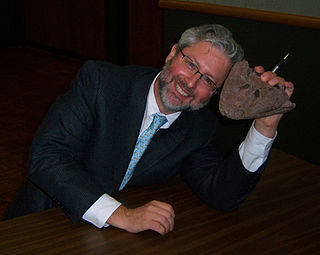A Quote by Paul Hawken
The problems to be faced are vast and complex, but come down to this: 6.6 billion people are breeding exponentially. The process of fulfilling their wants and needs is stripping earth of its biotic capacity to produce life; a climactic burst of consumption by a single species is overwhelming the skies, earth, waters, and fauna.
Related Quotes
At the beginning of the 20th century, there were less than 3 billion people on the earth, closer to 2 billion. By all measures that we can come up with right now,. with the lifestyle and consumption pattern of the Western industrial civilization, we can probably sustain about 2 billion people on this earth. We already have over 6 billion. China and India are aspiring to come on as industrial nations, aspiring to the lifestyle of the Western world, and it simply can't happen.
Take the entire 4.5-billion-year history of the earth and scale it down to a single year, with January 1 being the origin of the earth and midnight on December 31 being the present. Until June, the only organisms were single-celled microbes, such as algae, bacteria, and amoebae. The first animal with a head did not appear until October. The first human appears on December 31. We, like all the animals and plants that have ever lived, are recent crashers at the party of life on earth.
We have to prepare for what life could become in 40 years. We need to outline what is possible and what is impossible with the non-renewable resources of the Earth. What role will technological improvement play? Taking all this into account, what kind of life can we produce in the best way for 10 billion people? That's a problem that needs to be solved.
Our planet has been around only for four and a half billion years. Let's imagine a planet that has life on it such as life is on Earth and it's seven billion years old. Let's say that planet evolved intelligence. Well, that intelligence would be way more advanced than what we call intelligence here on Earth. How long has intelligence been around on Earth as we've come to define it?
How many people on Earth serve people? And how many people on Earth serve the Earth? The difference in the numbers must be enormous. It would reveal that the Earth is definitely not the primary concern of the human species. This might be fatal both to the Earth and to humanity. Please, leaders of the Earth and the nations, wake up to this potentially fatal disparity.
Air and Water can just swirl around being swirly, and Fire is just kind of aggressive, but my gut feeling is that Earth needs to work for a living. Earth has stuff to be doing. Earth is busy. Earth is solid and responsible and works hard. Earth is reliable. Earth is the designated driver of the elements and will always come over and feed the cat when you're out of town.
Here on Earth, we're exposed to asteroids hitting the Earth, eventual changes in the Sun, changes in the Earth's climate, things we're doing to the Earth's climate. If we want to survive, we need to become a multi-planet species. That's further down the road, but the first wave is going to be the explorers.
There are over a million types of fish in the sea as there are flowers in all of the world's gardens. There are at least a million different types of rocks/minerals as there are species of birds or monkeys. To believe we are the only "intelligent beings" on this earth and beyond is ignorance. The possible configurations of lifeforms that could be created from a single atom are infinite. There are at least a billion people on this earth, and no two faces look the same. It is very arrogant to assume that we have seen all of God's miracles.
We find ourselves ethically destitute just when, for the first time, we are faced with ultimacy, the irreversible closing down of the earth's functioning in its major life systems. Our ethical traditions know how to deal with suicide, homicide and even genocide, but these traditions collapse entirely when confronted with biocide, the killing of the life systems of the earth, and geocide, the devastation of the earth itself.
The fact that a cloud from a minor volcanic eruption in Iceland—a small disturbance in the complex mechanism of life on the Earth—can bring to a standstill the aerial traffic over an entire continent is a reminder of how, with all its power to transform nature, humankind remains just another species on the planet Earth.
We are the intelligent elite among animal life on earth and whatever our mistakes, [Earth] needs us. This may seem an odd statement after all that I have said about the way 20th century humans became almost a planetary disease organism. But it has taken [Earth] 2.5 billion years to evolve an animal that can think and communicate its thoughts. If we become extinct she has little chance of evolving another.
This influential, yet controversial idea requires that the mixture of species on Earth at any moment acts as a collective organism that continuously (yet unwittingly) tunes Earth's atmospheric composition and climate to promote the presence of life... But I'd bet there are some dead Martians and Venusians who advanced the same theory about their own planets a billion years ago.





































